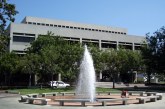

The latest meeting of the Parcel Tax Subcommittee did not break a lot of new ground on Thursday afternoon, however, they did set two important meetings for April as they move toward what they hope will be more formal action in May.
Joe DiNunzio and Alan Fernandes announced that they go before the school board on Thursday April 4 for a check-in that will either allow them to continue their process or perhaps incorporate additional ideas that their board colleagues have concerns about.
In the meantime, the subcommittee would also meet, a week late – on Wednesday, April 10, starting at 6 pm – in hopes that an evening meet could capture the attendance of working parents who might also have concerns that they want to pass on.
The hope is still to complete this discussion and planning process by May and bring it to the board to take more definitive steps toward placing a parcel tax on the ballot for 2020.
“Our board goal,” Alan Fernandes stated again, “is closing the compensation gap. We want to put us in a place where we’re competitive with other school districts.
“I don’t want this to just be a check-in,” he said speaking of the April meeting. “ I want us to drive at how we – maybe through the parcel tax – finally decide on our strategy for closing the compensation gap.
“There are other opportunities and outlets that we’ll continue to discuss,” he said.
In previous discussions, Mr. DiNunzio and Mr. Fernandes have sought to address a number of key concerns that parents and community members might have – in order to help push forward a process by which a  new parcel tax could be placed on the ballot to close the compensation gap from other districts.
new parcel tax could be placed on the ballot to close the compensation gap from other districts.
Joe DiNunzio pointed out that a key issue was getting clarification around the LCFF (Local Control Funding Formula) for constituents. He and district staff continue to believe that the LCFF is not something the district should strive to change.
They put it this way – Davis gets the same base funding as other districts, but due to relative affluence and low numbers of disadvantaged students, DJUSD does not qualify for as much supplemental funding.
Moreover, from Joe DiNunzio’s perspective, while Davis might receive less than other districts from the state, no one gets sufficient funding.
“Every district doesn’t get enough from the state,” he said. “We get funding from the state, that’s what we’re going to get right now. We have to figure out how to solve the problem.”
While Alan Fernandes noted the bottom line was figuring out a way to close the teacher compensation gap, in attendance were also the president of DTA (Davis Teachers Association) and CSEA (California School Employees Association).
Frank Thomsen, DTA president, pointed out that really the goal here was how to have the most effective instruction for the students.
“Students are the bottom line,” he said. “It’s always what’s best for them.”
A key metric will be looking at DJUSD in comparison to other school districts. Here Davis is really unique, as was pointed out in these numbers. There are over 1000 school districts in California, where perhaps 100 of them have a parcel tax, but many of those parcel taxes are relatively small – but DJUSD is believed to be really unique in the extent it relies on the local parcel tax to close the rest of the funding gap with the state.
For the most part, as Alan Fernandes has pointed out, “It’s been a positive thing in that it’s kept us whole.” At the same time, the parcel tax has become, in a way, path-dependent, taking the district down a path that is different than if it simply relied on unrestricted state money.
That has led him at various times to question if that path has been wholly healthy. “What if it’s taken us down a path where we’re further away from achieving the next level?” he asked – even if somewhat rhetorically.
“I don’t think it’s lost on us,” he said. “Maybe it’s not what we needed to do.”
“We are keenly aware of the fact that the state continues to underfund education at K-14,” Joe DiNunzio stated. He said, “We need more funding across the state. But we can’t assume that that’s going to change in the time that we have to make this decision.”
CSEA President Sande Royval pointed out, “People move here for the education.”
A big theme to understand is that people move to Davis and buy homes here in part because they want to provide their children with a good public education that might not be available elsewhere.
“The challenge,” she said, “is getting good and concise information to the community and (to) go out and knock on the doors.”
The goal at this point is to get as much clear and accurate information to the public as possible, to allow the community to make the decision as to whether or not to invest more in the education of this school district.
—David M. Greenwald reporting







I look askance at those comments… is he saying “we’re going to put less effort into our professional capacity if the compensation is not increased”? If he is talking about recruitment, why should ‘every boat float’? If he is talking about ‘retention’, am sympathetic… we want the best, skilled folk retained… those who are just ‘putting in their time’ (aka ‘cruise control’), not so much…
Folk don’t like to think about the fact that in DJUSD, we have great, good, average, marginal, and sub-marginal… anyone who denies that, is not paying attention… yet, the union wants everyone’s ‘boat to float’, and resists strongly any effort to deal with marginal or submarginal teachers.
The union (DTA) will act to protect any teacher, regardless of performance (yes, I know that is hard to quantify), unless the teacher is found guilty of a significant crime… goes to why I distrust unions…
I do believe in “pay for performance”… not so much for “pay for tenure”… the latter is the norm @ DJUSD… huge diff between 20 years of experience, and one year of experience 20 times…
I look askance at those remarks too, but, for a different reason.
Over my many years in education I heard every variant of the “I’m for the kids” mantra. I’ve heard it from every constituency in the education establishment. Can we simply stipulate that we all want what is best for the kids and move on? In my mind these kinds of statements, whether they come from trustees, managers, staff, consultants, vendors or teachers, are meaningless.
Where I disagree is holding the system economically hostage because you want to reinvent the wheel on the way labor is organized in public education. If you want to change the system and can come up with something better I wish you luck. Its a gargantuan lift. In the meantime refusing to fund an already underfunded system because you are unhappy about a labor system that has been in place for 60 years is essentially a “the floggings will continue until morale improves” argument.
I’m not looking to hold anything hostage… the DTA folk are the ones threatening the public, holding the “kids it’s for” hostage…
The reality is “it’s for the teachers” on the compensation issue…
It IS about the students… the teachers’ union is arguably using them as ‘human shields’…
Seems your argument is since we’ve had a system for 60 years, we should extend that for 60 years more…
DJUSD can do as it likes. My kids are not going back next year, we had enough.